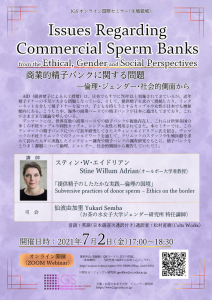IGS Seminar ‘Issues Regarding Commercial Sperm Banks from the Ethical, Gender and Social Perspectives’
| Date: | Friday, 2 July, 2021 | |
| Time: | 17:00 – 18:30 (JST), 10:00 – 11:30 (CEST) | |
| Online Seminar | (Zoom Webinar) | |
| Guest Speaker: | Stine W. Adrian (Aalborg University, Denmark) | |
| Moderator: | Yukari Semba (Project Lecturer, IGS) | |
| Language: | English and Japanese (with consecutive interpreting) | |
| Interpreter: | Naoki Matsumura (Colts Works) | |
| Registration: | Zoom Registration form |
|
Research presentation Abstract Subversive practices of donor sperm: Ethics on the border Sperm donation is an old reproductive technology. However, as it challenges preconceived understandings of family, sexuality, race, normality, kinship and relatedness, the technology continues to create political, ethical and regulative controversies globally. Questions such as to whom sperm donation should be available, how should sperm donors be categorized and selected, how can issues of kinship and relatedness be organized, and how can donation be performed without health risks, continues to be raised. As Danish private sperm banking has emerged, these negotiations are entangled with the global sales of sperm across national borders, and fertility travelers crossing of borders to obtain treatments. Drawing on two ethnographic fieldworks ten years apart in a Danish sperm bank and in Danish fertility clinics, this presentation will inquire into how normative negotiations, that in public debates are perceived as ethics, takes place through subversive practices of sales and uses of donor sperm across the Danish border. In this presentation I am going to unpack how these normative negotiations take place asking: How do different perceptions of what constitute responsible sperm donation unfold through normative negotiations and subversive practices, and how does changes of norms take place as controversies emerge when donated sperm and fertility travellers cross borders? Methodologically, I have followed the sperm in the bank from cryopreservation and categorization to the global sales of sperm. The practices of commodification and production of sperm has emerged as the banks have had to navigate in changing regulations in Denmark, the EU and abroad. The regulative changes likewise have played an important role in how sperm donation is used in the Danish fertility clinics where I have carried out fieldwork and interviewed staff and fertility travelers seeking treatment. Drawing on this empirical material, I show how negotiations of sperm donation enable us to understand how normativity’s constantly becomes reconfigured in the meeting of bodies, technologies and norms of making babies, or what Karen Barad has termed material-discursive practices. At the same time as this presentation is illustrative of how reproductive technologies include discriminatory potentials, conceiving the world through reproductive technologies also raise questions that show that worldings may take place in promising and less discriminatory ways. |
|
Biographical notes of Dr. Stine Willum Adrian Stine Willum Adrian is an Associate Professor in Techno-Anthropology at Aalborg University, Denmark. She is trained as a sociologist and holds a PhD in feminist STS and cultural analysis from the Department of Gender Studies, Linköping University, Sweden. Adrian’s work is interdisciplinary joining ethnography of medical technologies and feminist theory with cultural analysis, ethics and law. Her research interests lie in questions concerning reproductive technologies of life and death, gender, intersectionality, ethics of technologies, and ethnographic methods. Adrian has carried out several comprehensive ethnographic fieldworks of reproductive technologies, not least she has for years studied the globalization of Danish sperm and the increase in fertility travelers coming to Denmark for donor sperm. Her publications include ‘Rethinking reproductive selection: traveling transnationally for sperm’ (BioSocieties 15, 2020) and ‘Sperm stories: Sociotechnical imaginaries of sperm donation and sperm banking in Denmark’ (in Assisted Reproduction Across Borders, 2016) |
Organizer: Institute for Gender Studies, Ochanomizu University


